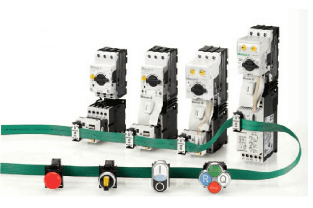Eaton Industrial Switchgear
PKZM4-63
MPCB, 55-65A, rotary type
Trade Price
£272.13
Per
1
Unit
EACH
Pack Quantity
1




Information
Eaton Moeller® series PKZM4 Motor-protective circuit-breaker, Ir= 55 - 65 A, Screw terminals, Terminations: IP00 PKZM4-63
Technical Specifications
Product Length/Depth
160 mm
Product Height
140 mm
Product Width
55 mm
Product Weight
1.136 kg
Certifications
CE
IEC/EN 60947
UL 60947-4-1
CSA File No.: 165628
CSA-C22.2 No. 60947-4-1-14
UL Category Control No.: NLRV
UL File No.: E36332
IEC/EN 60947-4-1
CSA Class No.: 3211-05
UL
VDE 0660
CSA
Actuator type
Turn button
Features
Phase-failure sensitivity (according to IEC/EN 60947-4-1, VDE 0660 Part 102)
Functions
Phase failure sensitive
Motor protection
Number of poles
Three-pole
Explosion safety category for dust
ATEX dust-ex-protection, PTB 10, ATEX 3012, Ex II(2) G
Lifespan, electrical
30,000 operations (at 400V, AC-3)
Lifespan, mechanical
30,000 Operations (Main conducting paths)
Mounting position
Can be snapped on to IEC/EN 60715 top-hat rail with 7.5 or 15 mm height.
Operating frequency
40 Operations/h
Overvoltage category
III
Pollution degree
3
Product category
Motor protective circuit breaker
Protection
Finger and back-of-hand proof, Protection against direct contact when actuated from front (EN 50274)
Rated impulse withstand voltage (Uimp)
6000 V AC
Shock resistance
15 g, Mechanical, According to IEC/EN 60068-2-27, Half-sinusoidal shock 10 ms
Suitable for
Branch circuit: Manual type E if used with terminal, or suitable for group installations, (UL/CSA)
Also motors with efficiency class IE3
Temperature compensation
-25 - 55 °C, Operating range
-5 - 40 °C to IEC/EN 60947, VDE 0660
<= 0.25 %/K, residual error for T > 40°
Altitude
Max. 2000 m
Ambient operating temperature - min
-25 °C
Ambient operating temperature - max
55 °C
Ambient operating temperature (enclosed) - min
25 °C
Ambient operating temperature (enclosed) - max
40 °C
Ambient storage temperature - min
40 °C
Ambient storage temperature - max
80 °C
Climatic proofing
Damp heat, cyclic, to IEC 60068-2-30
Damp heat, constant, to IEC 60068-2-78
Terminal capacity (flexible with ferrule)
1 x (0.75 - 35) mm², Main cables
2 x (0.75 - 25) mm², Main cables
Terminal capacity (solid)
1 x (0.75 - 16) mm², Main cables
2 x (0.75 - 16) mm²
Terminal capacity (solid/stranded AWG)
14 - 2
Stripping length (main cable)
14 mm
Tightening torque
3.3 Nm, Screw terminals, Main cable
Rated frequency - min
50 Hz
Rated frequency - max
60 Hz
Rated operational current (Ie)
65 A
Rated operational power at AC-3, 220/230 V, 50 Hz
18.5 kW
Rated operational power at AC-3, 380/400 V, 50 Hz
34 kW
Rated operational voltage (Ue) - min
690 V
Rated operational voltage (Ue) - max
690 V
Rated uninterrupted current (Iu)
65 A
Short-circuit current
60 kA DC, up to 250 V DC, Main conducting paths
Short-circuit current rating (group protection)
42 kA, 600 V High Fault, Fuse, SCCR (UL/CSA)
42 kA, 600 V High Fault, CB, SCCR (UL/CSA)
600 A, 600 V High Fault, max. CB, SCCR (UL/CSA)
600 A, 600 V High Fault, max. Fuse, SCCR (UL/CSA)
Short-circuit current rating (type E)
Accessories required BK50/3-PKZ4-E
50 kA, 480 Y/277 V, SCCR (UL/CSA)
50 kA, 240 V, SCCR (UL/CSA)
Short-circuit release
± 20% tolerance, Trip blocks
1008 A, Irm, Setting range max.
Basic device fixed 15.5 x Iu, Trip Blocks
Assigned motor power at 460/480 V, 60 Hz, 3-phase
40 HP
Assigned motor power at 575/600 V, 60 Hz, 3-phase
50 HP
Connection
Screw terminals
Overload release current setting - min
55 A
Overload release current setting - max
65 A
Tripping characteristic
Overload trigger: tripping class 10 A
Equipment heat dissipation, current-dependent Pvid
31.5 W
Heat dissipation capacity Pdiss
0 W
Heat dissipation per pole, current-dependent Pvid
11.17 W
Rated operational current for specified heat dissipation (In)
65 A
Static heat dissipation, non-current-dependent Pvs
0 W
10.2.2 Corrosion resistance
Meets the product standard's requirements.
10.2.3.1 Verification of thermal stability of enclosures
Meets the product standard's requirements.
10.2.3.2 Verification of resistance of insulating materials to normal heat
Meets the product standard's requirements.
10.2.3.3 Resist. of insul. mat. to abnormal heat/fire by internal elect. effects
Meets the product standard's requirements.
10.2.4 Resistance to ultra-violet (UV) radiation
Meets the product standard's requirements.
10.2.5 Lifting
Does not apply, since the entire switchgear needs to be evaluated.
10.2.6 Mechanical impact
Does not apply, since the entire switchgear needs to be evaluated.
10.2.7 Inscriptions
Meets the product standard's requirements.
10.3 Degree of protection of assemblies
Does not apply, since the entire switchgear needs to be evaluated.
10.4 Clearances and creepage distances
Meets the product standard's requirements.
10.5 Protection against electric shock
Does not apply, since the entire switchgear needs to be evaluated.
10.6 Incorporation of switching devices and components
Does not apply, since the entire switchgear needs to be evaluated.
10.7 Internal electrical circuits and connections
Is the panel builder's responsibility.
10.8 Connections for external conductors
Is the panel builder's responsibility.
10.9.2 Power-frequency electric strength
Is the panel builder's responsibility.
10.9.3 Impulse withstand voltage
Is the panel builder's responsibility.
10.9.4 Testing of enclosures made of insulating material
Is the panel builder's responsibility.
10.10 Temperature rise
The panel builder is responsible for the temperature rise calculation. Eaton will provide heat dissipation data for the devices.
10.11 Short-circuit rating
Is the panel builder's responsibility. The specifications for the switchgear must be observed.
10.12 Electromagnetic compatibility
Is the panel builder's responsibility. The specifications for the switchgear must be observed.
10.13 Mechanical function
The device meets the requirements, provided the information in the instruction leaflet (IL) is observed.
Document Links
Datasheet

